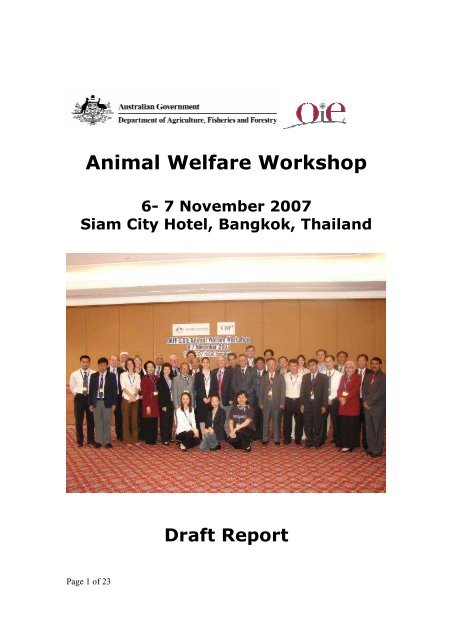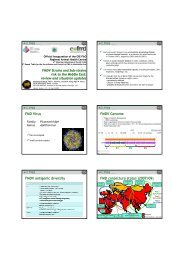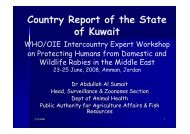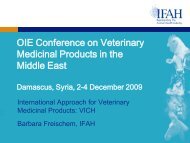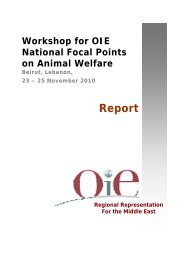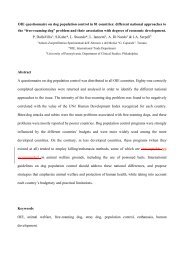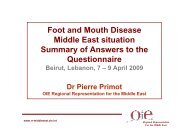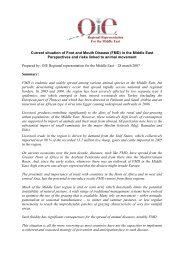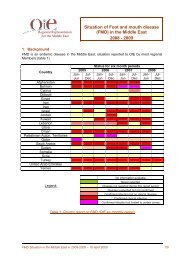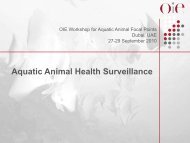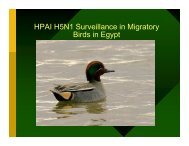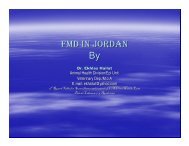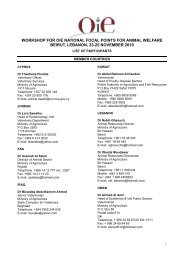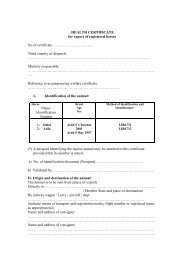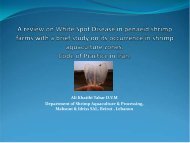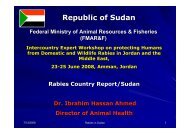d- Animal Welfare Workshop - Middle East - OIE
d- Animal Welfare Workshop - Middle East - OIE
d- Animal Welfare Workshop - Middle East - OIE
Create successful ePaper yourself
Turn your PDF publications into a flip-book with our unique Google optimized e-Paper software.
<strong>Animal</strong> <strong>Welfare</strong> <strong>Workshop</strong><br />
6- 7 November 2007<br />
Siam City Hotel, Bangkok, Thailand<br />
Draft Report<br />
Page 1 of 23
MONDAY 5 NOVEMBER 2007<br />
Welcome Address<br />
<strong>Animal</strong> <strong>Welfare</strong> <strong>Workshop</strong><br />
6- 7 November 2007<br />
Siam City Hotel, Bangkok, Thailand<br />
Dr Chaweewan, Deputy Director General of the Thai Government, Department of<br />
Livestock Development and vice president, <strong>OIE</strong> Regional Commission for Asia,<br />
the Far <strong>East</strong> and Oceania welcomed participant to the <strong>Animal</strong> <strong>Welfare</strong> <strong>Workshop</strong><br />
and to Thailand. She summarised the objectives of the workshop which were to<br />
discuss the <strong>OIE</strong> Guidelines for <strong>Animal</strong> <strong>Welfare</strong> from an Asian perspective,<br />
drawing on Australian and regional experiences on animal handling and welfare<br />
and to consider the value of Asian countries, DAFF and <strong>OIE</strong> Regional<br />
Commission for Asia, the Far <strong>East</strong> and Oceania developing a strategy to<br />
implement the guidelines.<br />
Dr Chaweewan wished participants well for a constructive workshop.<br />
Dr Gardner Murray, the President of the <strong>OIE</strong> Regional Commission for Asia, the<br />
Far <strong>East</strong> and Oceania thanked Dr Chaweewan Leowijuk for her opening address<br />
and welcomed participants to the <strong>OIE</strong>/DAFF <strong>Animal</strong> <strong>Welfare</strong> <strong>Workshop</strong>. He also<br />
passed on the <strong>OIE</strong> Director General, Dr Vallat’s, best wishes for a successful<br />
<strong>Workshop</strong><br />
Dr Murray was impressed by the number of people who were attending the<br />
meeting. 37 participants from 15 countries and 3 international organisations<br />
would attend the workshop (Attachment 1). This was a good mix of industry and<br />
government organisations.<br />
Gardner Murray emphasised the importance of animal welfare and the increasing<br />
public attention being given to the subject. He said welfare could not be divorced<br />
from sound animal health practices and this is why <strong>OIE</strong> and animal health<br />
services in individual countries had key roles to play in supporting animal well<br />
being.<br />
He pointed out <strong>OIE</strong> initiatives such as including animal welfare as a key<br />
component of its 3 rd and 4 th Strategic Plan and that land transport, sea transport,<br />
humane slaughter and killing for disease control guidelines had been approved<br />
by the International Committee. Guidelines under development were laboratory<br />
animal welfare, dog population control and animal welfare for production<br />
systems.<br />
Given the importance Australia attaches to animal welfare and its considerable<br />
experience in policy development, research, handling and transport<br />
arrangements, the Australian Department of Agriculture, Fisheries and Forestry<br />
(DAFF) had no hesitation in organizing and funding this joint <strong>OIE</strong>/DAFF<br />
Page 2 of 23
<strong>Workshop</strong> to discuss <strong>OIE</strong> guidelines and consider practical means of their<br />
implementation.<br />
Similar <strong>OIE</strong>/DAFF <strong>Workshop</strong>s were held in Bahrain in September 2005, Oman in<br />
November 2005 and Dubai in June 06. Dr Ghazi Yehia will discuss the outcomes<br />
of these meetings in his presentations and we can no doubt learn from the <strong>Middle</strong><br />
<strong>East</strong> experience.<br />
In conclusion, Dr Murray again thanked participants for making available their<br />
very valuable time to discuss the key global issue of animal welfare. He wished<br />
them well for a successful <strong>Workshop</strong>.<br />
TUESDAY 6 NOVEMBER 2007<br />
Welcome / Introduction<br />
Dr Murray again welcomed participants to the <strong>Workshop</strong>.<br />
He advised that the objective of the workshop was to discuss the <strong>OIE</strong> Guidelines<br />
for <strong>Animal</strong> <strong>Welfare</strong> from an Asian perspective drawing on Australian experiences<br />
on animal handling and welfare. A second objective was to consider the value of<br />
the <strong>OIE</strong> value of Asian countries, DAFF and <strong>OIE</strong> Regional Commission for Asia,<br />
the Far <strong>East</strong> and Oceania developing a strategy to implement the guidelines.<br />
He said the first part of the Program (Attachment 2) would provide background<br />
information and allow time for some questioning. Issues covered would include:<br />
<strong>OIE</strong> Guidelines, Regional Perspectives, Industry Perspectives and International<br />
Initiatives.<br />
This would be followed by a breakout session where 2 Groups would be formed<br />
to, inter alia, discuss the range and nature of welfare issues in the Region and<br />
consider what might be done to improve the situation in a practical and measured<br />
way.<br />
Following reports from the 2 Groups recommendations on a way forward would<br />
be discussed.<br />
He advised that participants would be given a CD with papers and presentations<br />
before they left and would receive a full draft report of the <strong>Workshop</strong> by the 16<br />
November 2007 for comment. If the workshop agreed he said he would seek to<br />
present the workshop outcomes at the Regional Commission for Asia, the Far<br />
<strong>East</strong> and Oceania meeting in Queenstown, New Zealand in November 2007.<br />
In conclusion, he advised that Ms Kristy McPhillips would provide information on<br />
administrative and other arrangements immediately before morning tea.<br />
Page 3 of 23
PRESENTATIONS:<br />
Outline of <strong>OIE</strong> Guidelines on <strong>Animal</strong> <strong>Welfare</strong><br />
Dr David Bayvel, Chair of the permanent <strong>OIE</strong> <strong>Animal</strong> <strong>Welfare</strong> Working Group.<br />
Dr David Bayvel provided an overview of the <strong>OIE</strong> Guidelines for <strong>Animal</strong> <strong>Welfare</strong>.<br />
He presented a global overview of animal welfare trends, strategic emphases,<br />
<strong>OIE</strong>/WAHO achievements and other international initiatives.<br />
He discussed the welfare versus’ rights debate and the differences in animal<br />
welfare between the southern and northern hemisphere and some aspersions<br />
debated about the northern hemisphere being ahead of the southern hemisphere<br />
and developing countries verses non developed countries.<br />
He said the <strong>OIE</strong> approach was to deal with welfare, not animal rights. <strong>OIE</strong> was<br />
trying to take a science based outcomes approach rather than one based purely<br />
on prescription. He stressed that animal welfare can not be used as a market<br />
access issue<br />
He concluded by describing <strong>OIE</strong>’s strategic objectives and key features such as<br />
stakeholder engagement.<br />
In response to a WSPA question on the World Bank and its role in animal<br />
welfare, Dr Bayvel advised that the <strong>OIE</strong> works closely with the World Bank on<br />
both animal health and welfare issues. The two published International Finance<br />
Corporation documents (Quicknote and Good Practice Note) cross refer to the<br />
published <strong>OIE</strong> Guidelines and were the subject of formal consultation with key<br />
international stakeholders including WSPA. The role of the World Bank Group in<br />
contributing to the implementation of <strong>OIE</strong> Guidelines is likely to be included in the<br />
program for the second <strong>OIE</strong> Global Conference on <strong>Animal</strong> <strong>Welfare</strong> to be held in<br />
October 2008 in Cairo Egypt.<br />
Regional Perspectives on <strong>Animal</strong> <strong>Welfare</strong><br />
Republic of Korea<br />
Mr Hwang Lee, <strong>Animal</strong> Protection and <strong>Welfare</strong> Division, National Veterinary Research<br />
Service<br />
Mr Hwang Lee discussed the regional situation on animal welfare in the Republic<br />
of Korea from a government perspective. He described organisational structures<br />
in the Republic of Korea (RoK) dealing with animal welfare and the promulgation<br />
of the new <strong>Animal</strong> Production Law (APL) on 26 January 2007. There has been<br />
much discussion in the RoK on all aspects of animal welfare with considerable<br />
consumer and media interest in layer hens and intensive pig production. The APL<br />
covers companion animals, laboratory animals and farm animals such as<br />
Page 4 of 23
transport and slaughter. He advised that the government was previously focused<br />
on companion animal welfare but now is doing more work on farm animals.<br />
Mr Lee noted EU efforts to include animal welfare in FTA negotiations and<br />
pointed out NGO’s has been most helpful in providing advice to Government.<br />
He advised that RoK has an animal welfare labeling system known as ORGA<br />
(meaning organic) <strong>Animal</strong> <strong>Welfare</strong>.<br />
In response to questions from Indonesia and Thailand on enforcement, Mr Lee<br />
advised that prosecutions could be recommended by officials and fines applied.<br />
He said NGO’s can report problems to the government officials.<br />
In response to a question from WSPA, Mr Lee advised the RoK welfare<br />
barometer applied to companion animals at this point in time. It was generally<br />
agreed that in “barometer” approach was a good idea.<br />
Mr Ian McIvor ALEC, complimented the Government of the RoK and its new<br />
legislation.<br />
Indonesia<br />
Dr Wiwiek Bagja, Indonesian Veterinary Medical Association<br />
Dr Bagja discussed the regional situation on animal welfare in Indonesia from a<br />
government perspective. She advised on the animal welfare legislation had been<br />
in place since 1967.<br />
A responsibility of the relevant sub Directorate in the Ministry of Agriculture is to<br />
prepare guidelines and training material. Deans in a number of key universities<br />
supported training in animal welfare.<br />
Dr Bagja emphasised that legislation on itself was not the answer. There is a<br />
need to change culture and train often uneducated people in animal welfare. If<br />
these plus other obstacles mitigated against rapid improvements as did a lack of<br />
prioritisation of work, limited knowledgeable human resources and poor<br />
infrastructure which did not meet contemporary needs.<br />
Dr Bagja concluded that animal welfare in Indonesia is still considered in a phase<br />
of introduction, done in form of public campaign and through education to<br />
government officials in related institutions. She said that regulation and technical<br />
guidance on animal welfare implementation are still in the phase of drafting with<br />
consideration of culture, custom, economy and religion aspects. She said despite<br />
the obvious obstacles efforts would be made to progressively improve<br />
approaches to animal welfare.<br />
Page 5 of 23
In response to a question from Pakistan on the management of stray dogs, Dr<br />
Bagja used as a case example the situation in Bali where actions included<br />
castration, spaying and if appropriate euthanasia.<br />
Industry perspectives on <strong>Animal</strong> <strong>Welfare</strong><br />
South <strong>East</strong> Asia Industry - <strong>Animal</strong> <strong>Welfare</strong> Issues – Who shall lead the way<br />
Dr Solomon Begnino Managing Director, FoodPro Consultancy<br />
Dr Begnino discussed the regional situation on animal welfare in South <strong>East</strong><br />
Asia, he said at times in the region a number of industry initiatives were bordering<br />
on cruelty and indifference. He suggested welfare could be looked at from an<br />
animal perspective and he expanded on this theme.<br />
Dr Begnino summarized legislative developments in a number of countries in the<br />
region and some shortcomings. Legislation was key to progress and lack of<br />
enforcement was a major problem.<br />
Some emphasis has been given to companion animal, but now greater attention<br />
was being to production animals. This was in large part due to the new genetics<br />
in the intensive production industries and attributable efforts.<br />
He concluded by saying that producers would have to accommodate to the new<br />
“genetics”. Economic drivers including export potential for the larger segments of<br />
industry and small holders would lead to progressive improvements.<br />
In response to a question from Vietnam on the relationship between hygiene and<br />
animal welfare, Dr Begnino said that good animal health and welfare practices<br />
were both necessary for the production of safe products.<br />
Indonesia Industry - <strong>Animal</strong> <strong>Welfare</strong> Issues<br />
Mr Teguh Boediyana, Executive Director, APFINDO<br />
Mr Teguh Boediyana advised that his talk would deal with the specific’s of the<br />
beef industry in Indonesia. He said that APFINDO is an association of those who<br />
have cattle and beef cattle businesses in Indonesia and there are 14 members<br />
and they import approximately 350,000 head per year and between them have<br />
5000 to 10,000 head of feedlot capacity.<br />
Mr Boediyana said Indonesia provides 70% of it product demand, smallholders<br />
providing the backbone of the supply. 30% of demand was met from importers<br />
including 350,000 head of feeder cattle from Australia and 50,000 tonnes of<br />
frozen beef and offal. Imported cattle are fattened in a feedlot for 2-3 months.<br />
Page 6 of 23
He emphasised the importance of good animal welfare practices to his industry<br />
and discussed cooperative projects with Australia at abattoirs and feedlots.<br />
The LiveCorp representative expanded on Australian support including<br />
restraining boxes at abattoirs. Discussion on this point reinforced the value of<br />
such activities to support Halal slaughter, operator safety and improved meat<br />
hygiene.<br />
WSPA asked a question on the forced hydration of animals. Advice provided<br />
indicated that the practice has been carried in central Java, Indonesia for 30<br />
years. It is now illegal but some forced hydration still occurs.<br />
<strong>Animal</strong> <strong>Welfare</strong> Issues<br />
Ms Sofia Parente, World Soceity for the Protection of <strong>Animal</strong>s (WSPA)<br />
Ms Parente described the role and work of WSPA, the Asian Coalition for Food<br />
<strong>Animal</strong>s, WSPA’s work in China and it policy objectives to replace long distance<br />
transport of animals with meat. She advised that WSPA have 800 member<br />
societies from 148 countries and has two offices in Asia, in Bangkok and Beijing.<br />
She advised of WSPA’s consultative status with the Economic/Social Council of<br />
the United Nations, and of a MoU with <strong>OIE</strong>.<br />
In discussing WSPA’s views on banning long distance transport of animals, she<br />
said there had been clear welfare problems including up to 1% mortality rates in<br />
export sheep from Australia to the <strong>Middle</strong> <strong>East</strong>. She said that, in phasing out the<br />
livestock export trade, <strong>OIE</strong> standards should apply.<br />
Ms Parente called for the introduction of <strong>OIE</strong> standards into national legislation.<br />
Finally Ms Parente told the workshop of a global project that they have underway<br />
into replacing long distance transport of animals to slaughter with a frozen meat<br />
trade. She said that more animals than humans are transported in one day and<br />
that it is time to put an end to long distance transport but realises it is a long term<br />
goal as all participants in the production sector need to be involved.<br />
In response to a question from Dr Bayvel, Ms Parente advised that the WSPA<br />
peer reviewed documents on banning the long distance transport to slaughter<br />
would be available next year.<br />
International Initiatives<br />
<strong>Welfare</strong> Challenges in the <strong>Middle</strong> <strong>East</strong>ern countries<br />
Mr Ghazi Yehia, <strong>OIE</strong> Regional Representative for the <strong>Middle</strong> <strong>East</strong><br />
Page 7 of 23
Mr Ghazi Yehia gave an overview of the animal welfare challenges in <strong>Middle</strong><br />
<strong>East</strong>ern Countries. He said animal welfare was a very wide and complex subject.<br />
It included animal health and production.<br />
He said the <strong>Middle</strong> <strong>East</strong>ern countries commonly operated “through the heart” on<br />
the basis of religious beliefs and human ethics. There had been interest in animal<br />
health, production and welfare in the region since the time of Hammurabi 3000<br />
years ago.<br />
Three workshops have been held in the region leading to the development of a<br />
Regional Strategic Plan, outputs and implementation arrangements. There was<br />
no conflict between <strong>OIE</strong> standards and religious requirements.<br />
Dr Yehia described the proposed <strong>Animal</strong> Health Decree for the <strong>Middle</strong> <strong>East</strong> and<br />
said the <strong>Middle</strong> <strong>East</strong> was the most advanced <strong>OIE</strong> region in the development of<br />
animal welfare issues. He invited participants to the <strong>OIE</strong> Cairo Conference<br />
scheduled for October 2008.<br />
Australian Legislative Framework<br />
Ms Kristy McPhillips, Australian Government, Department of Agriculture, Fisheries &<br />
Forestry<br />
Ms Kristy McPhillips outlined the Australian legislative framework. She advised<br />
that under the Constitution, state and territory governments are responsible for<br />
animal production and welfare within their jurisdictions. Although the Australian<br />
Government does not have legislative responsibility for this issue, it plays a<br />
leadership role by engaging the states and territories in the development of<br />
Model Codes of Practice for the <strong>Welfare</strong> of <strong>Animal</strong>s. The Model Codes of<br />
Practice are in place to define acceptable animal management practices, to<br />
promote humane and considerate treatment of animals, good husbandry<br />
practices, and to inform all people responsible for the care and management of<br />
animals about their responsibilities.<br />
Ms McPhillips advised that the Australian Government provides the legislative<br />
and administrative framework which underpins livestock export. State and<br />
territory governments provide and administer animal welfare legislation, which<br />
applies to all participants in the live export chain.<br />
Ms McPhillips also discussed the Australian governments, which includes,<br />
federal, state and territory and local government along with animal welfare lobby<br />
groups, the animal industries, the research community and the veterinary<br />
profession development and implementation of the Australian <strong>Animal</strong> <strong>Welfare</strong><br />
Strategy (AAWS). The AAWS provides a national framework for animal welfare<br />
that aims to maintain and improve the high standards of animal welfare that<br />
currently exist in Australia. The AAWS will ensure the ‘welfare of all animals in<br />
Australia is promoted and protected by the development and adoption of sound<br />
animal welfare standards and practices’.<br />
Page 8 of 23
She concluded by saying Australia has high level animal welfare standards for all<br />
uses of animals and that the Australian Government consults widely in all<br />
standards and guidelines developed by the government.<br />
Australian Export Industry<br />
Dr Danielle Marotti, Meat and Livestock Australia & Mr Cameron Hall, LiveCorp<br />
Dr Danielle Marotti and Mr Cameron Hall outlined how the Australian livestock<br />
export industry operates.<br />
Dr Marotti outlined the three research and development activities MLA was<br />
managing including land transportation, the “Fit to Load” guide and the “Fit to<br />
Export” guide. She described the design and preliminary results of the cattle<br />
transportation project for 6, 12, 24 and 48 hours of travel and advised the<br />
scientific paper for the project will be published in early 2008.<br />
Ms Marotti concluded by saying the welfare research program shows the<br />
significant commitment of the sheep and cattle industry to providing rigorous<br />
science based information to inform the welfare debate and underpin the<br />
development of welfare standards. As an example the research looking at<br />
welfare outcomes from different transport durations has been essential in<br />
informing the drafting of the Australian land transport standards. The<br />
communication activities also demonstrate the ongoing commitment of industry to<br />
increasing awareness of animal welfare within industry and their support for<br />
development of proactive communication materials.<br />
Mr Cameron Hall opened his address by stating long haul livestock transport<br />
could be carried out professionally and humanely. He said Australia had the<br />
highest shipping standards and much research was being funded to reduce<br />
mortality rates from 0.18% to 0.9% respectively.<br />
He described cooperative work being carried out at cooperative feedlots in<br />
Indonesian; stunning in the Philippines; slaughter house design in the<br />
Philippines, Malaysia and Indonesia; the husbandry of cattle under palms in <strong>East</strong><br />
Malaysia including Sabah, Sarawak and Peninsula Malaysia.<br />
He concluded by saying that sound animal welfare practices was intrinsically<br />
good and made good commercial sense as well.<br />
In response to a question from WSPA, Dr Marotti said that her work on land<br />
transportation of cattle would be peer reviewed and published. The paper would<br />
not deal with behavioural issues. Discussion indicated the importance of<br />
developing simple objective measures to determine stress, the need to cooperate<br />
and coordinate research activities and the importance of training animal handlers.<br />
Page 9 of 23
Breakout Session<br />
The workshop participants were divided into two groups<br />
Group 1 and Group 2 spokesperson presented their groups discussion. Reports<br />
of the breakout groups can be found attachment 3 and 4.<br />
Dr Murray in summarizing the presentations of the breakout groups said there<br />
were a number of common themes, they were as follows:<br />
<br />
<br />
<br />
<br />
<br />
<br />
<br />
<br />
<br />
The importance of recognising cultural religious, ethical and social issues.<br />
The level and nature of training and education needs.<br />
The need for public awareness<br />
The importance of countries providing details of focal/contact points to <strong>OIE</strong><br />
The value of writing a broad based strategic plan for the region with<br />
recommendations on implementation.<br />
Recognition of the fact that incremental approaches were appropriate.<br />
A need to work closely with NGO’s, industry and academic institutions.<br />
The value of outcomes focused standards and guidelines.<br />
The need to consider in due course matters of socio-economic importance<br />
including incentive structures and cost/benefit.<br />
A number of issues were raised during plenary session discussion including:<br />
<br />
<br />
<br />
<br />
<br />
<br />
The need to modify human behaviour patterns;<br />
Supply chain welfare issues recognizing that countries and parts of countries<br />
will have different priorities for attention;<br />
The importance of private industries and NGO’s in supporting animal welfare<br />
improvements;<br />
The value of articulating broad based policy/strategic approaches for general<br />
application with customization of country needs;<br />
The use of objective standards and where they might be applied and uinder<br />
what conditions; and<br />
The importance of socio-economic assessments to provide a basis for<br />
introducing good welfare practices.<br />
Recommendations<br />
The participants fully supported the development of a broad based strategic plan<br />
for the region with recommendations on implementation would be useful in<br />
achieving improvements in animal welfare in the Asian countries. It was noted<br />
that this could follow the model we have facilitated in the <strong>Middle</strong> <strong>East</strong>. Thus there<br />
would be a need for further extension work to continue build upon the outcomes<br />
of the workshop.<br />
Page 10 of 23
The workshop agreed upon 9 recommendations to further the adoption of <strong>OIE</strong><br />
consistent <strong>Animal</strong> welfare guidelines throughout the region to facilitate improved<br />
arrangements for production animals. They ware as follows:<br />
1. NOTED and SUPPORTED <strong>OIE</strong> policies and strategies on animal welfare<br />
including the development of Standards and guidelines.<br />
2. AGREED that countries should provide <strong>OIE</strong> with the names and<br />
addresses of animal welfare focal points.<br />
3. AGREED <strong>OIE</strong> should give consideration to providing training for<br />
nominated focal points.<br />
4. AGREED that a writing group be formed to draft a broad based regional<br />
animal welfare strategy for consideration by <strong>OIE</strong> in May 2008 and<br />
countries in the region.<br />
5. NOTED Australia would fund the meeting of the writing group.<br />
6. AGREED that documentation formulated at the workshop breakout<br />
sessions, together with the records of the meeting be used to inform the<br />
writing group in its work.<br />
7. AGREED that the writing group should provide broad guidance on the<br />
implementation and the establishment of a regional animal welfare<br />
coordination working group comprising of key stakeholders.<br />
8. AGREED that Dr Murray should report to the Regional Commission for<br />
Asia, the Far <strong>East</strong> and Oceania meeting in Queenstown in November on<br />
the outcomes of the workshop.<br />
9. NOTED the draft report of the workshop will be distributed to participants<br />
by 14 November 2007.<br />
Conclusion:<br />
Dr Murray advised that the recommendations are open for comment for a twoweek<br />
period until 28 November 2007, with the expectation that the<br />
recommendations would be adopted in the absence of objections. This would<br />
allow Dr Murray to present the <strong>Workshop</strong> Report and Recommendations to the<br />
Regional Commission for Asia, the Far <strong>East</strong> and Oceania meeting in<br />
Queenstown in November 2007.<br />
A WSPA representative advised the workshop of the Universal Declaration on<br />
<strong>Animal</strong> <strong>Welfare</strong>, a WSPA initiative to have a global and formal recognition of<br />
animals as sentient beings. She said the Universal Declaration on <strong>Animal</strong><br />
<strong>Welfare</strong> will encourage governments and intergovernmental agencies worldwide<br />
to take actions that will produce benefits for animals, people and the environment<br />
alike – benefits that are important for the members of the United Nations (UN)<br />
and the UN Millennium Development Goals. She advised that WSPA is aiming to<br />
have a resolution adopted by the UN in 2010 and a number of countries, such as<br />
the Philippines have already taken the lead in terms of promoting the UDAW in<br />
the international arena. WSPA would therefore like to invite other countries in<br />
Asia to promote UDAW in their countries and internationally.<br />
Page 11 of 23
Closing Ceremony:<br />
Dr Chaweewan thanked participants for their involvement in a successful<br />
meeting. She also thanked DAFF for funding the workshop. She concluded by<br />
saying she agreed with the recommendations and wished participants a safe<br />
return to their homelands.<br />
Dr Murray also thanked the participants again for making time to attend the<br />
workshop and expressed his willingness to discuss this issue at any time and to<br />
receive inquiries.<br />
Dr Murray thanked the Thai Department of Livestock Development, speakers and<br />
participants for their contributions. He also expressed his appreciation to DAFF<br />
for funding the workshop and to Kristy McPhillips for organising a most<br />
successful workshop and to Nicky Hungerford for her assistance during the<br />
workshop.<br />
Page 12 of 23
Attachment 1<br />
ANIMAL WELFARE WORKSHOP<br />
PARTICIPANTS LIST<br />
Name Organisation Country<br />
Dr Gardner Murray Consultant/ Chair Australia<br />
Ms Kristy McPhillips<br />
Dr Linda Corner<br />
Dr Bill Matthews<br />
Department of Agriculture, Fisheries<br />
and Forestry<br />
Department of Foreign Affairs and<br />
Trade, Australian Embassy Thailand<br />
Department of Agriculture, Fisheries<br />
and Forestry<br />
Australia<br />
Australia<br />
Australia<br />
Dr Danielle Marotti Meat and Livestock Australia Australia<br />
Mr Cameron Hall LiveCorp Australia<br />
Mr Ian McIvor Australian Livestock Exporters Council Australia<br />
Dr David Bayvel<br />
Ms Sofia Parente<br />
Dr Kate Blaszak<br />
Chair of the permanent <strong>OIE</strong> <strong>Animal</strong><br />
<strong>Welfare</strong> Working Group & Biosecurity<br />
Authority, Ministry of Agriculture and<br />
Forestry<br />
World Society for the Protection of<br />
<strong>Animal</strong>s (WSPA) - Asia<br />
World Society for the Protection of<br />
<strong>Animal</strong>s (WSPA) - Asia<br />
New Zealand<br />
Dr Chaweewan Leowijuk Department of Livestock Development Thailand<br />
Dr Ronello Abila<br />
Ms Nicky Hungerford<br />
Dr Ghazi Yehia<br />
<strong>OIE</strong> SEAFMD Regional Coordination<br />
Unit<br />
<strong>OIE</strong> SEAFMD Regional Coordination<br />
Unit<br />
<strong>OIE</strong> Regional Commission for the<br />
<strong>Middle</strong> <strong>East</strong><br />
Thailand<br />
Thailand<br />
Lebanon<br />
Mr Teguh Boediyana APFINDO Indonesia<br />
Dr Solomon Benigno<br />
Food Pro Consulting<br />
Dr Etty Wuryaningsih Directorate of Veterinary Public Health Indonesia<br />
Dr Wiwiek Bagja<br />
Indonesian Veterinary Medical<br />
Association<br />
Indonesia<br />
Mr Zafarullah Baloch Livestock & Diary Development Pakistan<br />
Page 13 of 23
Mr Muqarrab Ali Khan<br />
Department, Government of Balochistan<br />
Livestock & Diary Development<br />
Department, Peshawar<br />
Pakistan<br />
Mr Moon Kap Kim Ministry of Agriculture and Forestry Republic of<br />
Korea<br />
Mr Hwang Lee<br />
National Veterinary Research<br />
Quarantine Service (NVQRS)<br />
Republic of<br />
Korea<br />
Dr Victor Atienza Bureau of <strong>Animal</strong> Industry Philippines<br />
Dr Angel Antonio Mateo Bureau of <strong>Animal</strong> Industry Philippines<br />
Dr Khin Maung Win<br />
Dr Myint Htay<br />
Livestock Breeding and Veterinary<br />
Department<br />
Livestock Breeding and Veterinary<br />
Department<br />
Myanmar<br />
Myanmar<br />
Dr Dam Xuan Thanh Department of <strong>Animal</strong> Health Vietnam<br />
Dr Tran Ngoc Thang Department of <strong>Animal</strong> Health Vietnam<br />
Dr Pennapa Matayompong Department of Livestock Development Thailand<br />
Dr Than Sovyra<br />
Department of <strong>Animal</strong> Health and<br />
Production<br />
Cambodia<br />
Dr Fhaisol Bin Mat Amin Department of Veterinary Services Malaysia<br />
Dr Redzuan Bin Ibrahim Department of Veterinary Services Malaysia<br />
Dr Leow Su Hua Agri-Food & Veterinary Authority Singapore<br />
Dr Li Weihua<br />
Ms Wu Pei-I<br />
Ms Chou Wen-Ling<br />
China <strong>Animal</strong> Health and Epidemiology<br />
Center, Ministry of Agriculture<br />
Bureau of animal and Plant Health<br />
Inspection and Quarantine<br />
Council of Agriculture<br />
<strong>Animal</strong> Industry Department<br />
Council of Agriculture<br />
China<br />
Chinese<br />
Taipei<br />
Chinese<br />
Taipei<br />
Page 14 of 23
Attachment 2<br />
ANIMAL WELFARE WORKSHOP<br />
Organised and sponsored by the Australian Government, Department of Agriculture,<br />
Fisheries and Forestry<br />
6-7 November 2007<br />
Kamolmart Room<br />
Siam City Hotel<br />
BANGKOK, THAILAND<br />
PROGRAM<br />
WORKSHOP CHAIR: Dr Gardner Murray<br />
WELCOME RECEPTION<br />
6.30pm – 8pm, Monday 5 November 2007<br />
Location: Kamolporn 1 Room, Siam City Hotel<br />
Registration: 5:30pm – 6:30pm<br />
Welcome Addresses:<br />
- Dr Chaweewan Leowijuk, Deputy Directory General, Department of Livestock<br />
Development.<br />
- Dr Gardner Murray, President <strong>OIE</strong> Regional Commission for Asia, the Far <strong>East</strong><br />
and Oceania.<br />
Page 15 of 23
ANIMAL WELFARE WORKSHOP<br />
Tuesday 6 November 2007<br />
Registration: 8am – 9am – Kamolmart Room, Siam City Hotel<br />
TIME ISSUE PRESENTER<br />
9.00am Welcome/Introduction Dr Gardner Murray, President<br />
<strong>OIE</strong> Regional Commission for<br />
Asia, the Far <strong>East</strong> and Oceania<br />
9.10am<br />
9.45am<br />
10.30am<br />
11am<br />
11.45am<br />
World Organisation for <strong>Animal</strong><br />
Health (<strong>OIE</strong>) Guidelines for <strong>Animal</strong><br />
<strong>Welfare</strong><br />
Question time available<br />
Regional Perspectives on <strong>Animal</strong><br />
<strong>Welfare</strong>:<br />
Korea<br />
<br />
Indonesia<br />
Questions & Answers – 5 mins each<br />
MORNING TEA<br />
Industry perspectives on <strong>Animal</strong><br />
<strong>Welfare</strong>:<br />
South <strong>East</strong> Asia <strong>Animal</strong> <strong>Welfare</strong><br />
Issues<br />
Indonesian animal welfare issues<br />
WSPA<br />
Questions & Answers – 5 mins each<br />
International Initiatives<br />
<strong>Welfare</strong> Challenges in the <strong>Middle</strong><br />
<strong>East</strong>ern countries<br />
Australian regulatory framework<br />
Australian Export Industry<br />
Dr David Bayvel Chair of the<br />
permanent <strong>OIE</strong> <strong>Animal</strong><br />
<strong>Welfare</strong> Working Group.<br />
<br />
<br />
<br />
<br />
<br />
Mr Hwang Lee, NVRQS<br />
Dr Wiwiek Bagja,<br />
Indonesian Veterinarian<br />
Association<br />
Dr Solomon Begnino,<br />
FoodPro Consultancy<br />
Teguh Boediyana,<br />
APFINDO<br />
Ms Sofia Parente, WSPA<br />
Mr Ghazi Yehia , <strong>OIE</strong> <strong>Middle</strong><br />
<strong>East</strong><br />
Ms Kristy McPhillips, DAFF<br />
Dr Danielle Marotti, MLA &<br />
Mr Cameron Hall, LiveCorp<br />
Questions & Answers – 5 mins each<br />
1.00pm<br />
LUNCH – Patummat Restaurant<br />
2.15pm Plenary Discussion Gardner Murray<br />
2.45pm Breakout session to discuss animal Participants will be divided<br />
welfare issues in the region<br />
into 2 groups<br />
3.30pm<br />
AFTERNOON TEA<br />
4.00pm Breakout session continued<br />
5.00pm Close – Day 1 Dr Gardner Murray<br />
OFFICIAL DINNER HOSTED BY THE<br />
DEPARTMENT OF AGRICULTURE, FISHERIES & FORESTRY<br />
7pm - Pre-dinner drinks: Garden Pavilion<br />
7.30pm - Dinner: Spice & Rice, Private room on the 2 nd floor - Siam City Hotel<br />
Page 16 of 23
ANIMAL WELFARE WORKSHOP<br />
Wednesday 7 November 2007<br />
TIME ISSUE PRESENTER<br />
9.00am Review of outcomes from Day 1 Dr Gardner Murray<br />
9.15am Report on breakout session<br />
Chair of each group<br />
discussions<br />
10.10am Plenary Discussion <strong>Workshop</strong> Participants<br />
11.00am Next steps/other issues<br />
Dr Gardner Murray<br />
- Recommendations<br />
11.30am Closing Ceremony Dr Gardner Murray &<br />
Dr Chaweewan Leowijuk<br />
12pm<br />
LUNCH– Patummat Restaurant<br />
Page 17 of 23
ANIMAL WELFARE WORKSHOP<br />
GROUP 1 Report<br />
Attachment 3<br />
Question 1: What are the key issues/problems on animal welfare in countries,<br />
regions and sub-region<br />
- Outline the key differences and , if any.<br />
- What are the priority areas<br />
<br />
<br />
<br />
<br />
<br />
Must recognize the differences in religious, cultural, local conditions, and that<br />
the <strong>OIE</strong> guidelines must take note of these important considerations.<br />
There is a need to increase awareness through all levels of personnel/staff<br />
through more training and education.<br />
There is a need for harmonisation as different messages are articulated by<br />
different stakeholders which can be confusing for public. Stakeholders<br />
should come together to come up with agreed positions. <strong>OIE</strong>-DAFF<br />
workshop is a good example.<br />
Myanmar said that there is a need for gradual and sustainable development<br />
of animal welfare programs, taking into consideration various social,<br />
ecological & conservational issues to achieve harmony and balance.<br />
There is a perceived need for <strong>OIE</strong> to take lead in training and provision of<br />
refresher courses for member countries.<br />
Question 2: What are the values of the <strong>OIE</strong> Guidelines for <strong>Animal</strong> welfare<br />
progressing animal welfare issues<br />
- What <strong>OIE</strong> Guidelines should be developed<br />
[<strong>OIE</strong> Guidelines currently under development include laboratory animal welfare, dog<br />
population control, wild animals, and animal welfare for production systems.]<br />
<br />
<br />
<br />
<br />
<br />
<br />
<br />
Taiwan said that the <strong>OIE</strong> guidelines provide a good reference point to base<br />
standards on.<br />
Pakistan said that it is important to have legislation that can enforce<br />
guidelines.<br />
New Zealand where concerned with the lack of feedback from member<br />
countries on draft <strong>OIE</strong> guidelines and suggested member countries should<br />
appoint an animal welfare focal/contact point.<br />
Singapore suggested <strong>OIE</strong> develop guidelines on stray cat population<br />
management.<br />
WSPA advised that aquatic animal welfare is important especially when fish<br />
farming is becoming a major source of fish and wild caught volumes fall.<br />
Pakistan advised that Governments can work with NGOs eg WSPA on<br />
natural disaster emergency preparedness & response.<br />
Pakistan also suggested that the best animal welfare practices should be<br />
documented to raise awareness of what is possible to achieve.<br />
Page 18 of 23
Question 3: How can we improve the animal welfare situation in the<br />
region/countries<br />
- What options are worth considering Eg the development of a strategic<br />
‘umbrella’ plan to support in country activities.<br />
<br />
<br />
<br />
<br />
<br />
<br />
It was suggested that regional /national animal welfare coordination groups<br />
could be established to bring together all stakeholders to assist in implementation<br />
of <strong>OIE</strong> Guidelines, and address other regional/national issues.<br />
The GCC strategic plan drawn up after 2004 <strong>OIE</strong> conference and the <strong>Middle</strong> <strong>East</strong><br />
8th regional commission conference in Bahrain 2005 could be used as a possible<br />
model for the region or sub region. The group noted the importance of using a<br />
questionnaire to establish priority needs & points of commonality within the<br />
region to develop Strategic Plan.<br />
It was agreed that translating the <strong>OIE</strong> guidelines into national languages would<br />
be very useful in implementing the <strong>OIE</strong> guidelines.<br />
The production of illustrated pamphlets to capture key messages of <strong>OIE</strong><br />
guidelines in simpler format to reach wider audience would also be useful.<br />
It was noted that support from <strong>OIE</strong> animal welfare collaborating centres (eg<br />
Teramo, Italy; Massey, NZ) to member countries within the region would be very<br />
beneficial.<br />
Question 4: Do you have any additional comments<br />
<br />
<br />
<br />
<br />
<br />
<br />
<br />
<br />
New Zealand made the comment of not underestimating the importance of<br />
contribution made by animal health to welfare.<br />
Vietnam advised that ignorance in animal welfare is widespread and would<br />
like <strong>OIE</strong> to lead and guide less developed countries. An example of how this<br />
could be done would be to go through the mass media, with <strong>OIE</strong> preparing<br />
suitable communication material for member countries in addition to<br />
material produced by individual countries and each country could contribute<br />
an article.<br />
The group agreed that it is important that each country nominate a animal<br />
welfare focal point.<br />
The Republic of Korea said it is not easy to access resources on animal welfare<br />
information amongst Asian countries, and sometimes it’s not in English.<br />
They said there is a need for more research on benefits of +ve/-ve economic<br />
impact from animal welfare, particularly in developing countries with no<br />
export markets.<br />
Cambodia advised that the education level in their country is not high and<br />
there is a need to simplify and adapt guidelines to suit local conditions.<br />
Myanmar suggested that a task force to educate people in animal welfare<br />
issues at regional level should be established.<br />
Pakistan advised that there was a lack of clarity in roles between vets, farmers<br />
and government particularly when it came to disease reporting.<br />
WSPA suggested countries within the region respond to future request from<br />
DG to provide details of <strong>OIE</strong> guideline implementation initiatives on an<br />
annual basis.<br />
Page 19 of 23
There are school education program on animal welfare or responsible pet<br />
ownership in countries such as New Zealand, Singapore and ROK and it<br />
should be encouraged for other countries to do the same.<br />
ROK suggested that <strong>OIE</strong> should be referred to as WAHO hence forth.<br />
Page 20 of 23
ANIMAL WELFARE WORKSHOP<br />
Group 2 Report<br />
Attachment 4<br />
Question 1: What are the key issues/problems on animal welfare in countries,<br />
regions and sub-region<br />
- Outline the key difference and similarities, if any.<br />
- What are the priority areas<br />
Countries in group 2 explained what their animal welfare situation was in their<br />
country:<br />
China:<br />
At an introductory stage<br />
Production are varied, farmers pay less attention on animal welfare<br />
However, government pay more attention now<br />
Production cost increased in association with the animal welfare<br />
Thailand<br />
There are no animal welfare problems at GAP farms.<br />
There are animal welfare problems at small holders for red meat, transportation,<br />
slaughter workers.<br />
commercial benefit in AW practise<br />
GAP accreditation by Department of Livestock and Development- animal welfare<br />
is a part of inspection<br />
Australia<br />
Bad farmers become poor farmers<br />
Focussed on average/ standard practice – small population have different<br />
interpretation that caused problem—environmental issues quite unique issue<br />
Balance between commercial viability Vs morality<br />
Indonesia<br />
large volume of animals, lack of education, law and regulation, human resources<br />
Problems on recognition of <strong>OIE</strong> guidelines Vs traditional practice<br />
Profitability oriented as a key issue<br />
Right (and simple) messages on animal welfare to send across<br />
Food safety as a key driver, hence, to be linked with<br />
Malaysia<br />
Mainly economic driver for animal welfare<br />
“Key Tricker” – cultural and religion<br />
- Step-by-step approach to address the problems<br />
- NGOs network, local-social network<br />
- Specific situations of individual countries/ locations<br />
Page 21 of 23
Conclusion points:<br />
Group 2 agreed that animal welfare has been commonly practiced throughout the<br />
region, but varied, depending on economic, socio-cultural and religious drivers.<br />
Key issues are similar, except Australia. <strong>Animal</strong> welfare is till in infant stage. It is<br />
well recognised however that adopting/ adapting animal welfare can be<br />
economically/ commercially beneficial as well as increasing productivity/<br />
profitability.<br />
Although not strictly enforced within existing legislation/ regulation, accreditation<br />
scheme normally include animal welfare as a key consideration.<br />
There are implementation problems/ issues<br />
- Different perception and interpretation of animal welfare by various groups<br />
- Inadequate manpower and resource to implement (less priority)<br />
Recommendations:<br />
<br />
<br />
<br />
<br />
<br />
Basic standards implementable—minimum requirements;<br />
Step-by-step approach to address the problems;<br />
Make use of existing networks—NGOs , local-social cultural groups;<br />
Specific situations of individual countries/ locations; and<br />
Model development and responsible entity (influential personality).<br />
Question 2: What are the values of the <strong>OIE</strong> Guidelines for <strong>Animal</strong> <strong>Welfare</strong> in<br />
progressing animal welfare issues<br />
- What <strong>OIE</strong> Guidelines should be developed<br />
[<strong>OIE</strong> Guidelines currently under development include laboratory animal welfare, dog<br />
population control and animal welfare for production systems.]<br />
<br />
<br />
<br />
<br />
<br />
Indonesia said that there is enough <strong>OIE</strong> Guidelines for the time being—as<br />
existing ones not even fully implemented, more guidelines mean more<br />
implementation issues.<br />
Australia suggested that production guidelines/ on-farm guidelines as minimum<br />
requirement would be practically achievable.<br />
Thailand suggested that locality/country specific guidelines—e.g. climatic<br />
differences, tropical VS temperate, should be developed.<br />
The group noted that most data/information came from developed countries to<br />
develop guidelines and that they needed modification to fit the developing<br />
context<br />
<strong>OIE</strong> member countries should be more active in commenting on the guideline<br />
draft(s), especially from a developing country perspective.<br />
Recommendation:<br />
<br />
<br />
<br />
Encouraging implementation of the developed guidelines;<br />
Simplify the guidelines for layman language;<br />
Development of manual(s) on training of trainers; Conduct of training of these<br />
courses;<br />
Page 22 of 23
Included in university curriculum;<br />
Public awareness and information distribution, this could be achieved by having<br />
a media star distribute information;<br />
Development of key indicators—should be standardised and based on specific<br />
country’s situation and locality;<br />
Should prioritise key issues in terms of implementation of the <strong>OIE</strong> guidelines<br />
Need to identify target audience; and<br />
<strong>OIE</strong> to provide assessment tool.<br />
Question 3: How can we improve the animal welfare situation in the<br />
region/countries<br />
- What options are worth considering Eg the development of a strategic<br />
‘umbrella’ plan to support in country activities.<br />
<br />
<br />
<br />
<br />
Through the development of “Strategic Plan” at regional, subregional, national<br />
level (to be supported by all relevant stakeholder including NGOs, industry , etc.)<br />
Implementation of <strong>OIE</strong> guidelines should provide incentive/rewarding system<br />
to encourage compliance.<br />
Commercial driver/ requirement will be emerging; there is a need for a<br />
“competent” entity to ensure reasonable expectation/ implementation<br />
<strong>Animal</strong> welfare issues to be put into the right context (of other guidelines/<br />
standards)- such as GAP, food safety standards, etc.<br />
Question 4: Do you have any additional comments<br />
Any change to existing <strong>OIE</strong> guidelines or development of new guidelines should<br />
have outcome focus rather than prescriptive in nature.<br />
Page 23 of 23


